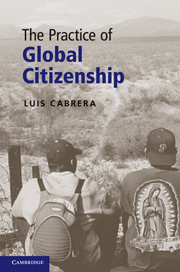Book contents
- Frontmatter
- Contents
- Preface
- Acknowledgments
- Introduction
- Part I Theoretical concerns
- Part II Global citizenship in practice
- 4 Minutemen and desert samaritans: citizenship practice in conflict
- 5 Mobile global citizens
- 6 Global citizen duties within less-affluent states
- Part III Advocacy and institutions
- Conclusion: the practice of global citizenship
- Appendix
- Works cited
- Index
6 - Global citizen duties within less-affluent states
Published online by Cambridge University Press: 05 June 2012
- Frontmatter
- Contents
- Preface
- Acknowledgments
- Introduction
- Part I Theoretical concerns
- Part II Global citizenship in practice
- 4 Minutemen and desert samaritans: citizenship practice in conflict
- 5 Mobile global citizens
- 6 Global citizen duties within less-affluent states
- Part III Advocacy and institutions
- Conclusion: the practice of global citizenship
- Appendix
- Works cited
- Index
Summary
Relatively little attention has been given by cosmopolitan theorists to the possible duties of the globally less-affluent. They have tended to give overwhelming emphasis to the duties of materially secure individuals within affluent states, with strong emphasis on contributory duties. In a framework of global citizenship, where all are seen as having equal standing in a global human community, the need to independently consider the duties of representative persons in less-affluent states becomes more apparent. That is not to say that the primary focus of such an exercise should be on the ways in which the global poor could be held collectively responsible for their own vulnerabilities. Nor should such duties be conceived simply as the terms that the global poor must accept as conditions of receiving aid from those states or individuals willing to give it. Rather, a partnership frame is advocated here, in which all persons are seen as co-equal partners in shared efforts to secure core rights. All have both rights and corresponding duties, with duties distributed according to ability and, in the present system, willingness to discharge.
I will begin by looking at some problematic ways in which the duties of the global poor might be, or actually have been, conceived. Particularly problematic are approaches which hold up some severe empirical constraint as reason to demand that the less-affluent submit to harsh or oppressive measures to achieve some outcome. Consider, for example, some of the neo-Malthusian claims offered in the 1960s, when it appeared to many that global population was far outstripping global capacity to produce food, and that famine loomed on an unprecedented scale. Under such constraints, some argued, even seemingly extreme policies could be justified. In one of the most prominent such arguments, population biologist Paul Ehrlich asserted that, since food production and distribution capacities could not possibly keep pace with global population, extremely coercive control measures were justified, including the restriction of outmigration from affected areas and the withholding of US food aid from the neediest countries, e.g., India.
A cancer is an uncontrolled multiplication of cells; the population explosion is an uncontrolled multiplication of people. Treating only the symptoms of cancer may make the victim more comfortable at first, but eventually he dies – often horribly. A similar fate awaits a world with a population explosion if only the symptoms are treated. We must shift our efforts from treatment of the symptoms to the cutting out of the cancer. The operation will demand many apparently brutal and heartless decisions. The pain may be intense. But the disease is so far advanced that only with radical surgery does the patient have a chance of survival. (Ehrlich 1968, 166–7)
- Type
- Chapter
- Information
- The Practice of Global Citizenship , pp. 154 - 178Publisher: Cambridge University PressPrint publication year: 2010

